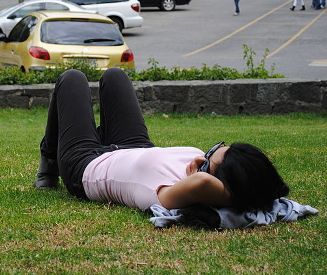Health
2 Great Tips for Better Sleep
Guest Blogger:Carol Carter 
Do you find yourself constantly yawning throughout the day? Are you always tired or irritable? You may be suffering from lack of sleep. Even if you’re in bed for the usual amount of time, the quality of your sleep may be low. This will leave you not feeling rested. Read on for two important steps in getting better sleep and sustained energy throughout the day.
Go to Bed before Midnight
Your body produces key hormones and chemicals only at night. Therefore it is important to go to sleep before midnight. Chemical processes in our brain work in cycles that can take several hours to complete. Going to bed early ensures that these cycles occur between the key hours of midnight and 6 am. For example, testosterone, a very important hormone that has to do with muscle growth and recovery, will only be secreted between this special timeframe. It can be produced in other ways, but sleeping is a time when it is produced naturally.
Some studies suggest that the lack of light during these hours is what allows these processes to unfold. If you live in a dense urban area, take special care to turn off electronic devices that shine any form of light other than blue-spectrum light. You may need to get special blinds or use a thick blanket to block out the light from street lamps and vehicles. Exposure to light just once during the night resets the whole process of chemical secretion and sleep cycles.
For some people, they sleep with the television on because it helps them sleep, or they sleep with their windows open to allow the moonlight to penetrate through. These two are romantic notions, but they are dangerous for your sleep.
Get At Least 8 Hours of Sleep
More than half of adults report feeling tired or exhausted throughout the day. Many use stimulants such as caffeine and energy drinks. While these may provide a short-term burst of energy, they do not solve the root cause of the problem – lack of sleep. Getting enough sleep regularly (about 8 hours for the average adult) will ensure sustained levels of energy. Some people say they can function on 4-6 hours of sleep a night, but they cannot maintain that for very long.
To find out how much sleep you need, go to bed early for two weeks at the same time every night. Record the times you wake up naturally without the use of an alarm clock. Take an average of these times and you’ll learn the amount of sleep you need every night.
If you don’t want to risk waking up too late for work, school, or other obligations, set an alarm clock.
Running this experiment for two whole weeks is key to allow yourself time to eliminate any ‘sleep debt’ you may have. Sleep debt is accumulated lack of sleep that has to be regularly dealt with; otherwise it could lead to long-term health consequences. Some professions force people to get less sleep each day, i.e., emergency workers, first responders, etc., but on the whole, the average adult should strive for 8 hours per day.
It may be necessary to adjust your lifestyle somewhat to take full advantage of the benefits afforded by each of these suggestions. Do what’s right for you; get better quality rest for a healthier and happier life. People say sleep is overrated, but it’s actually quite the opposite. It is underrated and it is so vital to have it every day. In some cases, the amount of sleep you get dictates how you’re going to do that day. Start now to try to get at least eight hours of sleep per night. Your body will thank you for it.
About the Author
Carol Carter is nutritionist and currently associated with SleepDisorders.com. She often writes health-related articles. Apart from writing, she loves to cook, read and at times go for a walk with pet dog.




